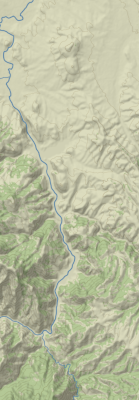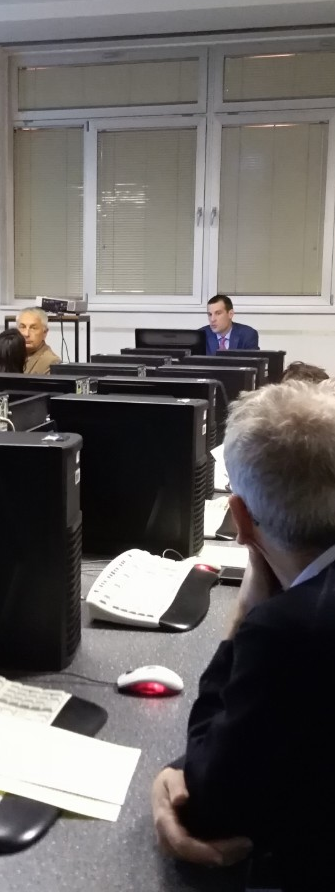|
|
|
|
|
|
|
|

|
Digitising Patterns of Power
Newsletter No.4 / December 2018
|
Dear Ladies and Gentlemen,
Dear Colleagues,
The fourth year of our project DPP is coming to an end, which also marks the conclusion of our Digital Cluster Project at the Institute for
Medieval Research of the Austrian Academy of Sciences in Vienna. Therefore, the DPP Newsletter will experience a transformation in the
beginning of 2019. The Long-Term Project "Tabula Imperii Byzantini (TIB)" of the Austrian Academy of Sciences will succeed the DPP Newsletter
and launch its successor, namely a Newsletter called the "HistGeo-Newsletter", with its first issue due in March 2019. This "HistGeo-Newsletter"
will include news and reports from the fields of Mapping, Digital Mapping, Historical Atlases and of Historical Geography of the Byzantine Commonwealth.
If you have registered for the DPP Newsletter, you will continue to receive the new HistGeo-Newsletter in 2019.
|
|
|

|
Two scholarly milestones in the conclusion and publication of DPP will be achieved in the year 2019 and presented to the public. Firstly, we will put our DPP frontend online in the beginning of April 2019 and enable unrestricted queries of our data in the world wide web. Secondly, we will publish and promote our edited volume entitled “Power in Landscape – Geographic and Digital Approaches on Historical Research” in May 2019 in Vienna.
Wishing you a very Merry Christmas and a Happy New Year 2019, also on behalf of the DPP team!
Yours sincerely,
Mihailo Popović, PI of DPP
|
|
|
|
|
|
|
|

|
Two Milestones in 2019
|
DPP is a cutting edge project within Digital Humanities and uses as well as develops digital tools for data-acquisition, data-management, processing as well as for analyses, visualisation, communication and publication. In 2019 the DPP team will focus on two scholarly milestones, which will conclude our project:
In the beginning of April 2019 the frontend of DPP will be put online. This frontend was developed by the Team Department of Geography and Regional Research of the University of Vienna and is called DPP Mapviewer. It is the prominent frontend of DPP, a key aspect of the project and serves two equally important functions: one function is to enable the scholars of DPP to view their spatial data and to explore spatial relations between different database entities and, thus, gain insight into the medieval landscape. The second function of the application is to present the research of DPP and its results to an interested public audience in the world wide web. The aforesaid Team Department of Geography and Regional Research has also created a query builder, which allows the user to explore the data stored within the DPP OpenAtlas Database and to see the results on the map.
|
|
|

|
|
Moreover, the same team has designed a customised DPP map and a DPP map modern. The difference lies in the fact that the second one shows features of modern infrastructure like urban areas, dam lakes etc., while the first has been adjusted by clearing these data sets in order to present and visualise the embedded medieval data of our project in the best possible way. In addition, the analogue maps of the Long-Term Project Tabula Imperii Byzantini (TIB) at a scale 1 : 800,000 have been georeferenced and embedded as an additional layer into the DPP Mapviewer.
The second milestone will be the publication of an edited volume on our project entitled “Power in Landscape – Geographic and Digital Approaches on Historical Research” with the publishing house Eudora in Leipzig in May 2019. The respective volume includes scholarly contributions of the entire DPP team as well as renowned national and international scholars. It will be officially promoted in Vienna in May 2019.
|
|
|
|
|
|
|
|

|
Impressions from the
DPP Conference
|
|
The concluding conference of DPP took place on 18-19 October 2018 at the Austrian Academy of Sciences in Vienna and had the aim to present the project results to academia as well as the interested public. It was entitled "Power in Landscape – Geographic and Digital Approaches on Historical Research". The opening speech was delivered by our Director of the Institute for Medieval Research of the Austrian Academy of Sciences, Professor Dr. Walter Pohl.
We had the pleasure to welcome two international keynote speakers, namely Professor Dr. William Cartwright (RMIT University, Australia) and Professor Dr. Joseph Patrich (University of Jerusalem, Israel), who introduced the audience to specific methods in Archaeology, Cartography, GIScience and Digital Humanities.
|
|
|

|
Our DPP Team presented the research accomplished on its six case studies and various aspects of the Software Engineering (i.e. of OpenAtlas).
Our project partner, the Team Department of Geography and Regional Research (University of Vienna), spoke in detail on the visualisation
of the respective data, the related WebGIS as well as issues of GeoCommunication. We had the excellent opportunity to interact with invited
international scholars from the Czech Republic, Germany, France and Italy, who provided a fascinating insight in their scholarly research
and digital projects. Please consult the detailed programme of the conference and its speakers following the link: https://dpp.oeaw.ac.at/conference/
The scholarly and digital results of the project DPP and this conference will form an integral part of the edited volume on our project entitled
“Power in Landscape – Geographic and Digital Approaches on Historical Research” (see above).
|
|
|
|
|
|
|
|

|
Scholarly Results of
DPP Presented
|
In the last quarter of 2018 we had again the opportunity to present our scholarly results, both historical and digital, to interested audiences throughout Europe. Mihailo Popović gave two scholarly papers at the Central European University (CEU) in Budapest entitled “Big Data in Byzantium? Thoughts on the Analysis of Byzantine Regions from the Viewpoint of Historical Geography and Digital Humanities” and “Digital Tools for an Analogue Age: How to Apply Digital Humanities on Byzantine Sources and Space” on 10-11 October 2018.
Veronika Polloczek took part in the 23rd International Conference on Cultural Heritage and New Technologies – Visual Heritage in Vienna (12-15 November 2018)
and spoke on “The Digital Tabula Imperii Byzantini (Dig-TIB) as Contribution to the World’s Cultural Heritage”. Then, M. Popović presented a paper entitled
“Тумачење садржаја средњовековних повеља из угла историјске географије и дигиталне хуманистике” at the University of Belgrade (28 November 2018) in
the wake of the promotion of the “Diplomatarium Serbicum Digitale / Српски дигитални дипломатар”
|
|
|

|
|
On 18 December 2018 M. Popović will give a paper on “Zwei Reliefkarten des Balkans – ein „ungewöhnlicher“ Blick auf Skopje und auf Montenegro
im ersten Viertel des 20. Jahrhunderts” as DPP Lecture.
Our scholarly highlight in May 2019 will be the aforesaid public promotion of our edited volume and of the DPP frontend, which will mark the conclusion of the project DPP. As Principal Investigator of DPP I am very much indebted to the Austrian Academy of Sciences and especially to the Director of the Institute for Medieval Research, Professor Dr. Walter Pohl, for his incessant support, to Professor Dr. Claudia Rapp (Director of the Division of Byzantine Research, Institute for Medieval Research, Austrian Academy of Sciences) as well as to Mrs. Michaela Popp, the Institute’s administrator, for her tireless help in all administrative matters.
|
|
|
|
|
|
|
|
|
|